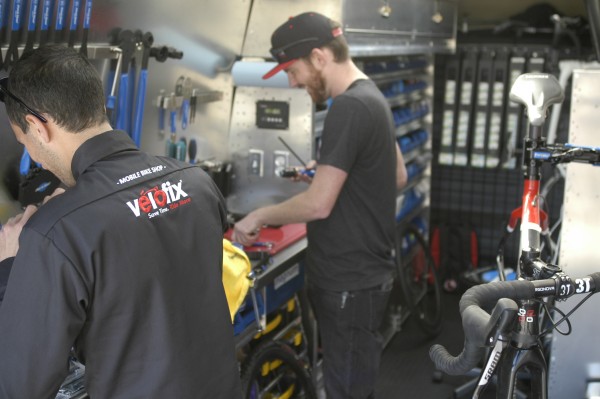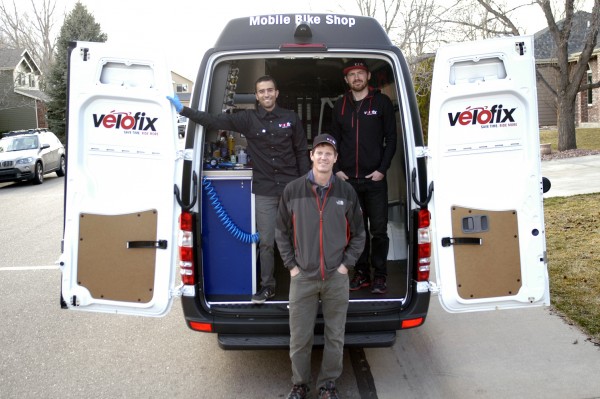My friend, and team mate Trent Newcomer, came back to Kansas last weekend and rode the Gravelluer’s Raid with us. Trent rode Leadville last year and is a pretty good rider. He is also a veterinarian who really helped out a ton with Bromont’s cancer issues last year. Sounds like the guy has his plate pretty full to me. But, no. So he decided to get into the mobile bike shop business. He got a couple Sprinter vans and now serves the Fort Collins/Boulder area.
I talked to him a little about it and he said it is picking up speed. He has been talking to some business, Google and such, and they want to supply the service to their employees and cover the costs. It is super for a company to do this. But they also do individuals, of course. Anyway, here is link to their website. I guess it is a franchise, Vélofix. He says he has two top notch mechanics. Pretty cool idea. If you need your bike fixed in his area, sounds like a good way to go. Website link.

Tucker is 4 months old today, so that is 2 1/2 years old in human terms? Seems about right. He is chewing things. I have to leave him in his little nylon crate when I’m riding now. So far he has killed a Garmin, a couple shoes, some headphones and of course, a few water bottles. I thought I had a little angel until a couple days ago. Not so lucky.







http://www.cbc.ca/dragonsden/pitches/velofix setup by Chris Guillemet, Simon Whitfield & Boris Martin
Simon Whitfield is out of Canada, big triathlete from Kingston ontario, just 2 hours from where I’m at…
looks like a good investment, I think in the cycling world the key is keeping a low inventory, esp now a days. As things change so quickly – from 9 to 10 to 11 to 12 speeds in just 4 years or so… I still ride 8 speed, I ain’t touching that new electronic shifters. Having worked big defence the past 20 years or so with electronics and mechanical stuff, I know the MTBF on parts. Take into account that parts hit things, that impacts them even further (ie Q value of a coil for example by being knocked around)… expensive stuff to fix. And, I won’t touch carbon due to the fatique limits. Aluminum is the worst, Ti is the best.
So, a mobile van might work if they can keep the inventory low. I suspect as gas prices increase, profits are squeezed though. A more intelligent way of doing things might be a mobile bike unit with a trailer? And, just in time delivery of parts. Keeping in stock most common parts required…
a growing thing is on line training and life coaches… gotta watch the pyramid schemes going on and making sure that coaches have suitable experience. I know many that have the education but not much actual digging of the ditches. A good teacher has dug the ditches and has faced hardship… a book worm can’t do that…
A growing area that I could see is – mobile applications in training… with a coach to review the stats… the app would record what a person has done in the day and the coach would fine tune the approach based on the expected goals of that person… food intake, scheduled exercise regime, mood, and goals would be recorded (power level, heart rate, etc…).
what I do hate now a days though – is the regimented and schedule events for kids. Kids should be doing stuff and learning stuff adhoc… instead, I see all these hugely over priced coaching events cropping up. Kids shouldn’t be treated like robots, kids should be out exploring a variety of things, then in their later teenage years specializing in a sport.
This is a huge industry in Europe and growing here. Makes sense – you don’t take your bike to the shop, they come to you. In many cases they come by, pick it up and then return it later. There is a cost premium associated but it is a solution to a huge problem. Bike shops suck at doing repairs – especially on bikes they didn’t sell. Blanket statement because I deal with some shops that are good.
This business would die in a small city with no bike culture. It will flourish in others.
As for the statement, Simon Whitfield is a big triathlete … that is kind of like saying that Alberto Contador is a big cyclist. This guy won the first Olympic Gold and then followed up with a silver two Olympics later. He is one of the top short course racers of all time 😉
a mobile van might work if they can keep the inventory low.
Employee overhead is far bigger. It’s a brutal business for the worker though regardless of whether or not the shop is on wheels.
Institutional customers might chose the service over shuttling bikes to a shop. A smart shop owner should be out pitching service to institutional customers anyway.
There is a cost premium associated but it is a solution to a huge problem. Bike shops suck at doing repairs
I can’t speak to other countries, but in the U.S. few are willing to pay a premium for bicycle service. Few regions have customers with expensive enough bikes to warrant the premium and then those premium owners are quite rarely LBS customers.
That is not to say customers don’t respond well to high-touch service. It’s that customers complain about the cost of replacing a tire and now you want to charge a premium on that.
The van thing is not a bad idea, but needs some luck and skill to execute and make a profit.
In America – this idea will only work in cycling hot-spots. Ft. Collins/Boulder being a perfect example of such an area. Add the fact that people who live there can afford the luxury of such a service makes it a great idea. No doubt there are tons of Colorado State students who rely on their bicycle as their primary mode of transportation – and I can see them wanting to save blowing an afternoon getting to the shop for the fix – opting instead to stay home and study while it gets fixed. Best of luck!
I’m not sure how you keep the inventory low unless you have a great supply chain and customers willing to wait for repairs. Work any local century ride and take a look at the bikes coming through the checkout stations and there are dozens and dozens of different parts required to perform even basic repairs due to all the different brands, components, etc.
bring on “uber” like bike repair shop….
specialists on wheels, frame issues (ie welding), drivetrain, groupset, etc…
thus if the pool of talent is large enough in a populated city, those with special services could post their talent on a cycling hub network (CHN)… an uber like service could pick up the bike part (or bike) deliver it to the specialist and have it back in a specified amount of time (need it sooner rather than later, pay a delivery priority service fee etc…).
that way inventory is kept low, specialists work on their specialties (ie good wheel builders are hard to find or frame welders… go to cuba for fine welders or custom made stuff, superb! broke a bolt while cycling in Cuba, had some guy make one from scratch…)
anyone runs with this idea, I want a cut of the profit 🙂
should see this sort of thing grow over time from auto repair right through to university courses…
opps… too late, just emailed uber on this idea…
Ok, sounds great! You need your super high-end bicycle worked on? I’ll be there to pick it up from you in no time flat (to never been seen by you again)! That’s a perfect idea! Yeah right…..
As Steve noted, the business model isn’t focused on attracting individual clients, but rather corporate clients that want to offer various “concierge services” to their employees. IE, keep their butts AT WORK, in their chairs for more hours a day. To help encourage it, you provide auto detailing, barbers, massage therapists, bike repair, etc. Anything that might require an employee to leave the work site and go home.
We had these services at eBay, and I imagine much of Silicon Valley had them too. The owners of such businesses aren’t interested in setting competitive prices for flat tires vs. brake adjustments. They’re seeking long-term arrangements where the income (priced as a flat-fee) is more predictable and ongoing. Get yourself 10-20 “regulars” and you’ve got yourself a legit business.
Boulder and Ft. Collins have a burgeoning tech industry, with lots of butt-in-chair workers who’d love to be “pampered” like this while they slave away.
http://pedaltothepeople.com/
In Chicago there is a mobile bike shop that will come to you.
I lost two sofas, my wallet (but she laid out the credit cards before destroying the wallet), an Akubra hat, a pan of brownies, two legs of the dining table…oh, so much and that was in less than a week. There are no “good dogs” at that age, destruction is normal. I bought a Great Dane sized crate for mine, which was about 2 sizes larger than needed, but it made me fell better about it and she loved it. It’s easy to forget the destructive years.
This makes me laugh.
I dabbled in mobile repair back-in-the-day with limited success, but these franchise schemes should have the tech and logistics dialed-in to make it work, especially as the bike industry slowly strangles the independent bike shop via online/direct sales. If I had to make a living solely on turning a wrench AND lived in an area with suitable demographics I’d be seriously looking into this.
I’d imagine that the only way to make a go of doing repair for individuals would be to get them on some kind of ongoing retainer for flat-rate, all-inclusive (to a certain limit) service at regular intervals.
When I was racing and doing a train commute to NYC, I had limited free time to clean and tune my bike (not to mention the lack of workspace), but had it been available, I’d have gladly coughed-up $75 a month for someone to drop by and take care of (tune, clean) my bike once a week.
You’ve got to think of ways to get regular, incoming cash flow, not just fixing flats for once-a-year riders. You could do designated “fix a flat” clinics out of a parking lot every Saturday, etc. There are ways. But to market it as a person one-time concierge bike fix? It’ll sink fast.
Awesome. Because Uber drivers are also certified bike mechanics.
Hello Achmed…please uber me home and fix my bike.
I’m not so sure – when your toilet’s broken you don’t often throw it on top of the car and haul it to the plumber’s shop, so why should a bike be different? I presume these franchise operations will be set up on the ‘net so someone looking for bike repairs will find them, review the rates and book it like the infamous Uber, etc. The available tech will be summoned to show up for the job. If the demographics are right (don’t forget road cycling’s the new golf after all!) there could be enough volume for a guy to make a decent living. He sure ain’t gonna do it at a brick&mortar store after the bike industry kills IBD’s off. The cost of the truck, upkeep and franchise fees are likely to be far less than rent on a building, property taxes, advertising costs and all the rest.